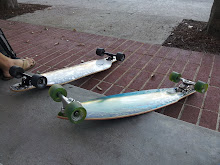There's no website I can find for this event - I think it's just in one of the galleries that participates in the Long Beach Artwalk.
Anyway. I'm playing an hour-long set in Long Beach during the Artwalk (or after or something. I'm not sure.) Here's the information.
Feb 12 at 8pm
Catalyst
430 E. 1st Street
Long Beach, CA 90802
For more information about Catalyst, check out this website at http://www.gocatalyst.org/. This is my first time getting involved with them, and the evening will also be featuring an artist, Joey Paytner, and another band, SHE (not to be confused with the Taiwanese girl group of the same name...) - here's the write up on...um...us:
Cynthia Wang is part singer-songwriter and part graduate student. After teaching herself guitar in college when she realized she couldn't fit a piano into her dorm room, Cynthia started writing songs, although her first public performance took place a good 3 years after she started down the road of music creation and GAS (Guitar Acquisition Syndrome - she owns nine guitars), at Komuzika's Fall Residency Program in 2006. Cynthia's demo album,which was recorded and engineered at Big Brother Studios in Simi Valley, was released at the end of 2007, right before traveling and graduate school took over her life. After spending the last few years in New York City, where her singer-songwriter side laid dormant while grad-schooling, she recently moved back to Los Angeles and is currently writing material for a new album, while performing as time allows. She has played at venues such as the Ventura Majestic Theatre, the Derby, Cat Club on the Sunset Strip, and Bar Lubitsch. She has also performed at Five Star Variety Hour in New York City, and Tuesday Night Cafe in Los Angeles. You can find Cynthia's music at http://www.cynthiawangmusic.comSHE is a Long Beach based all girl band consisting of 3 musicians: Kris Suafilo (lead guitar/lead singer), Tina Stephenitch (bass guitar/vocals) and Carole Maducdoc (drums). The three have played together off and on in various bands for the past 5 years. About 9 months ago their passion to play music brought them back together to form SHE, an alternative rock band performing covers and originals. Influenced by groups such as; Pearl Jam, Green Day, Offspring, Joan Jett, U2 and the Red Hot Chili Peppers. Their mission: to engage people with music that is meaningful, entertaining and fun!Joey Paynter has traveled to 33 countries volunteering her time to help prostitutes and lepers in Thailand, provide services to aborigines in Australia and volunteered in medical centers in the Solomon Islands. She has worked in Orphanages in Bali, Surabaya, Thailand and South Africa. She has counseled refugees and those with HIV/AIDS in South Africa and ran groups for children that have been victims of sexual abuse. She has provided relief trauma therapy to those in Haiti and has spoken to thousands of people in high schools, Universities and churches about injustice and awareness. She has worked on several photojournalist projects in the Middle East, Bali, South Africa, Panama, Brazil (Amazon), and Haiti. Joey helped create a 30 day devotional: “A Voice for the Voiceless”, which has been translated into 6 different languages with over 100,000 copies distributed world wide. Her photography from the Amazon is published in the book, “A Voice for Life” and her photography has been displayed overseas in Australia, as well as in galleries and shops in Oregon, South Carolina, and California. Joey received her Masters of Science in Clinical Psychology from Vanguard University and has worked in a variety of therapeutic settings. She currently resides in Newport Beach, California and her passion is to empower others to discover and connect with their soul.



